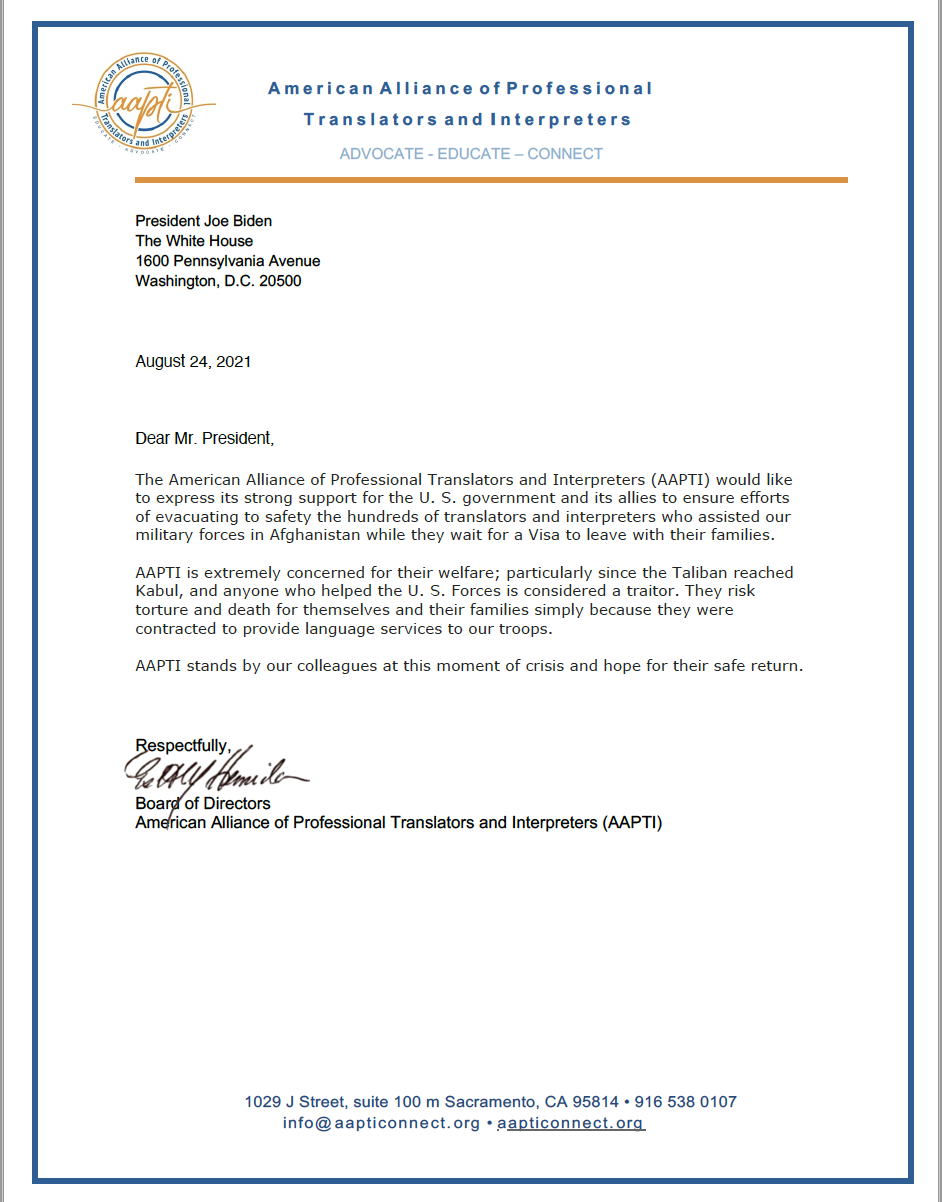
The Happening Now page provides links to Bills and Legislation that impact the professional translators and interpreters in the United States. The information provided is from external sources and its intended for informational purposes only.
AAPTI'S OPINION ON CURRENT MATTERS

AAPTI’S OPINION ON THE REQUEST FOR PROPOSALS FROM THE JUDICIAL COUNCIL OF CALIFORNIA FOR THE CONTRACTING OF LIMITED TELEPHONIC AND REMOTE INTERPRETER SERVICES:
It goes without saying that technology significantly facilitates the provision of numerous services at all levels. Nonetheless, it is important to seriously consider that in the case of court interpreting, said services have major implications on the rights of Californians.
With respect to the public bidding process (RFP) for contracting limited telephonic and remote interpreter services, AAPTI expresses its concern and interest over the following:
- Contains loopholes due to technicalities that will jeopardize the quality of language access and the contracting processes.
- Lacks accountability standards for the quality of services on the part of each of the stakeholders (interpreters, language services agencies, and employers).
- Overly vague regarding the criteria to determine what qualified interpreters are and what certification credentials they will need to so demonstrate.
- Does not definite sufficient mechanisms to monitor compliance with the obligations and responsibilities of each party, including, but not limited to certification and quality, tools, technology, and encryption for information protection. A body should be established to fulfill this function.
- Does not define processes to ensure confidentiality and protection of user information.
Given the above implications on language access, AAPTI is convening a summit to discuss this issue. Some points to address could be:
1. Define “qualified” interpreters.
2. Differentiate between bilingual customer service personnel and interpreters. We are interpreters.
3. Create processes to ensure compliance with the rights of users of interpretation services in California.
4. Equal enforcement of compliance for all interpreters who provide interpreting services to California users.
5. Fair and lawful treatment for interpreters in California with respect to requirements and compensation.
Given the deadline for submission of proposals, it is of the utmost importance to have a dialogue to protect and defend not only interpreters but also to protect the rights of the people of California. AAPTI will make an open Meeting Call to bring stakeholders together!
AAPTI's Position on OPI VRI .pdf
APRIL 17, 2022
|
SIGN OUR PETITION
Preserve the Use of Certified/Registered Interpreters in All Legal Matters
https://www.change.org/supportCCI
AAPTI’s letter of support urging the Supreme Court to hear a case related to the use of a non-certified Korean interpreter.
Click to read the letter. Letter to SupremeCourtCA-emh.pdf
PRO Act UPDATE - AUGUST 2021
AAPTI recognizes the importance of ensuring and strengthening the voice for independent professional translators and interpreters in the policy arena, and thus we continue educate and engage policymakers on a host of issues. Among those issues that has taken center stage this year and has been of concern, is the federal PRO Act, which includes language around the ABC test.
On July 22nd, the U.S. Senate Health, Education, Labor, and Pensions (HELP) Committee held a hearing to discuss the PRO Act. Below is a brief summary highlighting some of the discussion regarding the PRO Act and the ABC test:
- •Senator Hickenlooper (D-CO) asked, “can you confirm, and just reiterate, that the ABC test within the PRO Act will only be used regarding workers’ rights to join a union? And then can you explain how this test could help -- how it would help level the playing field?”
The response by Dr. Shierholz, Senior Economist and Director of Policy at the Economic Policy Institute, was that the ABC test that is within the PRO act will only be used regarding workers’ rights to join a union to help level the playing field. This would only apply to the rights workers have under the National Labor Relations Act(NLRA), which guarantees the right of private sector employees to organize into trade unions, engage in collective bargaining, and take collective action such as strikes. Central to the Act was a ban on company unions; this bill only seeks to make sure workers are not misclassified.
- •Senator Baldwin (D-WI) asked, “What problem is the PRO Act, the Protecting the Right to Organize Act’s, ABC test trying to fix? And, how will it work? And will it require freelance workers to become W-2 employees?”
The response by Mr. Pearce, Executive Director of the Workers’ Rights Institute, highlighted – The ABC test is only there to classify who is actually an employee for the purposes of the acts of coverage. The ABC test assumes someone is an employee unless: the worker is free from the employer’s control or direction in performing work; the work takes place outside the usual business; and the work that is being performed is independently done.
- •Senator Moran (R-KS) asked, “How would the franchise business model ability to promote entrepreneurship be affected by the PRO Act?”
The Senator then used the example of CA AB 5 independent contractors, how much of a mistake it was, and pointed out that it had to eventually be amended to allow exemptions. Additionally, pointing out that the Pro Act has no exemptions.
Ms. Soralia, Principal & Managing Partner Ellis Hospitality, highlighted - AB 5 should not be the standard. If something like the PRO Act is passed it may cause a franchiser to not want to go into business with me. Furthermore, causing business growth to come to a halt.”
Although, the HELP committee hearing provided an opportunity for much discussion around the PRO Act and to provide greater understanding and clarity regarding specific components of the bill, the committee did not take action to vote on the bill. Despite having already passed the House of Representatives, and having support among many in the Senate, the PRO Act at this time does not appear to have the votes required to move the bill to the President’s desk.
APPTI will continue to keep you updated on the discussions and debates revolving around the PRO Act.
AAPTI would like to remind our colleagues that we cannot achieve our goals in the policy-making arena without your support. Every little bit counts!! Please join AAPTI today or Give to the cause.
Thank you!
